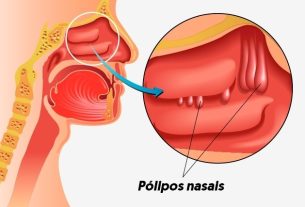A blocked nose during pregnancy is a common situation, especially between the 2nd and 3rd trimester of pregnancy, and occurs in most cases due to hormonal changes common during this period, which favors greater production and accumulation of secretions.
In most cases this situation improves after childbirth, however it is interesting for women to adopt some home practices that help eliminate excess mucus, promoting symptom relief. Therefore, it may be interesting to take a bath with hot water, do water vapor inhalation and wash your nose with saline solution, for example.
Main causes
The main cause of a blocked nose during pregnancy is gestational rhinitis, which normally occurs between the 2nd and 3rd trimester of pregnancy and is a consequence of the increase in estrogen levels during this period. Thus, due to hormonal changes, it is possible for there to be an increase in blood volume and dilation of the veins present in the nose, which favors greater production and accumulation of mucus, leaving the nose blocked.
Furthermore, a blocked nose during pregnancy can also occur as a result of respiratory infections, such as the flu or cold, sinusitis or allergic rhinitis.
Regardless of the cause, it is important that some actions are taken to reduce nasal congestion and discomfort, and the obstetrician may recommend the use of nasal decongestants or natural treatments. Furthermore, it is important to initiate appropriate treatment to reduce the risk of complications due to changes related to oxygen circulation, such as maternal hypertension, pre-eclampsia and changes in intrauterine growth, for example.
What to do
A blocked nose during pregnancy usually improves after childbirth, however, to alleviate discomfort and prevent complications, the doctor may recommend some home and natural measures to make secretions more fluid and facilitate their elimination, some of which are:
- Take a bath with hot water, blowing and washing your nose during the bath;
- Wash your nose with saline solution, using a nasal wash that you can buy at pharmacies or drugstores;
- Inhale water vapor using a basin of hot water;
- Drink around 1.5 L of water per day;
- Increase consumption of foods rich in vitamin C to strengthen the immune system, such as guava, broccoli, orange or strawberry;
- Place several pillows or a wedge on the bed to keep your head elevated when lying down.
In addition, women can also use an air humidifier, as by increasing the humidity in the air, it makes breathing easier and helps the nose to unclog. A homemade option to humidify the air is to place a bowl of hot water or a wet towel in the bedroom or living room. See other homemade tips for unblocking your nose.
Can pregnant women use nasal spray?
The use of nasal sprays should only be done when indicated by the doctor monitoring the pregnancy, because some nasal sprays can, in addition to causing dependence, interfere with the baby’s development.
Therefore, before using a decongestant, it is important to consult your doctor so that he can recommend the most suitable nasal spray, which in most cases is Sorine or Neosoro, and how to use it.
Bibliography
- SHEEP, Fabio A.; GREGORIOA, Lucian L.; BONGIOVANNIA, Giuliano; IZUA, Suemy C.; KOSUG, Edward M. Rhinitis and pregnancy: literature review. Braz J Otorhinolaryngol. Vol 82. 1 ed; 105-111, 2016

Sign up for our newsletter and stay up to date with exclusive news
that can transform your routine!
Warning: Undefined array key "title" in /home/storelat/public_html/wp-content/plugins/link-whisper-premium/templates/frontend/related-posts.php on line 12
Warning: Undefined array key "title_tag" in /home/storelat/public_html/wp-content/plugins/link-whisper-premium/templates/frontend/related-posts.php on line 13




